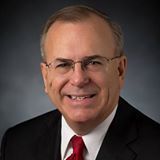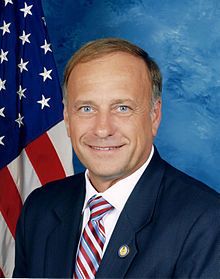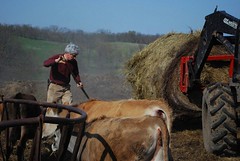Tom Vilsack appears to be on track for unanimous confirmation by the Senate as Secretary of Agriculture in Barack Obama’s cabinet. At his confirmation hearing yesterday, Republicans didn’t ask hostile questions, and Vilsack didn’t have to explain away any embarrassing behavior like Treasury Secretary-nominee Timothy Geithner’s failure to fully meet his tax obligations over a period of years.
Despite the lack of drama, Vilsack made a number of noteworthy comments during the hearing. Here are some highlights.
Vilsack told senators on Wednesday that
The Obama administration wants to accelerate the development of new versions of biofuels made form crop residue and non-food crops such as switchgrass. The plants’ fibrous material, or cellulose, can be converted into alcohols or even new versions of gasoline or diesel.
“Moving toward next-generation biofuels, cellulosic ethanol, is going to be really important in order to respond” to concerns about the impact on food prices of using grain for fuel, he said.
Vilsack addressed a range of other issues, pledging, for example, to promote fruit and vegetable consumption and promising to ensure that any new international trade agreement is a “net plus for all of agriculture.”
It makes a lot of sense to produce ethanol from perennial plants that are less energy-intensive to grow and need fewer herbicides, pesticides and fertilizer than corn.
Vilsack’s opening statement also
promised swift implementation of the Conservation Stewardship Program (CSP) which, alone among farm bill conservation programs, has languished under the Bush Administration since passage of the 2008 Farm Bill last May.
A little later during the hearing, Vilsack described the Conservation Stewardship Program as important for the environment and cited its potential to boost farm income and create jobs.
By the way, Vilsack’s disclosure documents show that he collects payments from the US Department of Agriculture on some Iowa farmland he and his wife own:
The former Iowa governor and his wife, Christie, have been receiving payments since 2000 for an acreage in Davis County that is enrolled in the land-idling Conservation Reserve Program, according to USDA data compiled by the Environmental Working Group.
In a Jan. 8 letter to USDA ethics officials, Vilsack said he would seek a waiver to continue receiving CRP payments while he is secretary. Otherwise, experts said, he would have to break his contract and reimburse the USDA for all previous payments he has received, which would total nearly $60,000.
Craig Cox, Midwest vice president of the Environmental Working Group, a research and advocacy organization, welcomed having an agriculture secretary who receives conservation payments.
At a time “when simultaneously protecting our soil, water, wildlife habitat and climate is an urgent priority, it is encouraging that our new secretary of agriculture is personally participating in a conservation program that does just that,” he said.
I’m with Cox; it’s good for the secretary of agriculture to have first-hand knowledge of the conservation reserve program’s value.
Earlier this week the Register published an article on the opening statement Vilsack prepared for his confirmation hearing:
Tom Vilsack is promising to use the U.S. Department of Agriculture to “aggressively address” global warming and energy independence.
In an opening statement prepared for his Senate confirmation hearing on Wednesday, President-elect Barack Obama’s nominee for agriculture secretary also said he would use the department to “create real and meaningful opportunities” for farmers and to guarantee that rural communities grow and prosper. […]
Vilsack, a former mayor of Mount Pleasant, also said rural communities continue to lose population and “find it increasingly difficult to keep pace with the ever-changing national and global economy.”
He pledged to try to resolve the long-standing civil rights claims against the department.
“If I’m confirmed, the message will be clear: discrimination in any form will not be tolerated,” Vilsack said.
After reading that Register article, La Vida Locavore’s Jill Richardson commented,
I want to see our subsidy structure change to reward farmers for sustainability instead of yield. I want the government to ease the financial risk on any farmer transitioning to organic because it appears to me that being an organic farmer isn’t so bad on your bank account, but transitioning alone might break several farmers financially. I want to outlaw CAFOs altogether. But will Vilsack do this? Let me just say this: I am so confident he won’t that I promise now to entirely shave my head if he DOES do each of these 3 things.
I think we can all agree that Jill is not going to look like Sinead O’Connor anytime soon. I totally agree with her first two suggestions. As for CAFOs, it’s not realistic to expect them to be banned, but I believe they would be greatly reduced in number and size (over time) if government policy made them pay for the harm they cause.
On a more encouraging note, I read this at the U.S. Food Policy blog:
Some highlights included Vilsack’s encouragement of locally grown fruits and vegetables and pronouncement that they should be grown not just in rural areas, but everywhere. He announced that he met with Health and Human Services nominee Tom Daschle last week in order to demonstrate the importance of working together for nutrition. “It’s going to be important for us to promote fresh fruits and vegetables as part of our children’s diets. . .that means supporting those who supply those products” and making it easier for consumers to buy locally grown products, Vilsack said.
Maybe Vilsack and Daschle will take some of Angie Tagtow’s excellent advice on how their agencies can work together to improve human health. I would also encourage them to read this recent piece by Steph Larsen: “For healthy food and soil, we need affordable health care for farmers.”
I am curious about what Vilsack means by “supporting those who supply” locally-grown fresh fruits and vegetables. One problem with our current agricultural policy is that commodity farmers lose all federal subsidies if they put more than two acres into growing fruits or vegetables. Apparently that was the price needed to get California’s Congressional delegation to vote for various farm bills over the years. Even though almost no subsidies go directly to California farmers, this penalty limits the competition California growers might otherwise face from Midwestern farmers.
So, very little of the produce consumed by Iowans is grown in Iowa, and our grocery stores are full of produce trucked in from thousands of miles away. Most of the crops Iowa farmers grow are inedible for humans without processing.
A few years back the Leopold Center for Sustainable Agriculture at Iowa State University published a report on “Food, Fuel and Freeways.” It showed how far food travels to Iowans and how much Iowans could reduce greenhouse-gas emissions if we increased the proportion of locally-grown food in our diets to even 10 percent of what we eat.
Getting back to the Vilsack hearing, members of the Senate Agriculture, Nutrition and Forestry Committee made some notable comments yesterday. who questioned Vilsack made some notable comments on Wednesday. Iowa’s own Tom Harkin, who chairs the committee, gave Vilsack a warm welcome:
“I just couldn’t be more proud to see you sitting there. I don’t think President-elect [Barack] Obama could have picked a better person for this position,” Harkin said.
Harkin also discussed federal child nutrition programs:
Agriculture Chairman Tom Harkin , D-Iowa, said reauthorization of a law (PL 108-265) governing school lunches and other child nutrition programs “is really the only thing that we have to do this year.” […]
During the hearing, Harkin said he will propose that the Department of Agriculture use Institute of Medicine guidelines to set standards for junk food sold in schools. Current USDA school food standards exempt most snack foods, because they aren’t a part of subsidized lunches.
During the last renewal of the child nutrition act, then-Gov. Vilsack wrote a letter to lawmakers and the Bush administration expressing concern about childhood obesity and the problem of vending machine snacks that compete with school meals.
At the time, Vilsack backed limits on the kinds of snacks and beverages students can buy outside the lunch line. Nutrition advocates want junk food kicked out of schools, but many schools use the cash from sales to cover the rising costs of meal services.
(Side note: the state of Iowa is now considering banning the sale of junk food in public schools.)
Meanwhile, Iowa’s Republican Senator Chuck Grassley urged Vilsack to act quickly on several other fronts, including rule-making that would protect smaller volume livestock producers. Also, Grassley and Democratic Senator Byron Dorgan of North Dakota wrote an open letter to Vilsack asking him to close a loophole affecting commodity program payment limits. Ferd Hoefner, Policy Director of the National Sustainable Agriculture Coalition, explains that “This particular loophole is the single most important one allowing mega farming operations to collect payments in multiples of what otherwise appears to be the statutory dollar limit.”
According to Hoefner,
Another former chairman, Pat Leahy (D-VT), weighed in with a comment that the Department is not keeping up with the rapid growth of organic and then with a question asking whether it wasn’t time for the Department to get on with the business of actually actively promoting organic. Vilsack said we need to “celebrate and support” organic and USDA should view it as one very legitimate option in a menu of options for improving farm incomes. Then, in response to an extended monologue from Senator Pat Roberts (R-KS) deriding organic as marginal, Vilsack held his ground, but diffused the implied antagonism, saying the Department needs to support the full diversity of American agriculture.
The Ethicurean blog published an excerpt of Roberts’ insult to “small family farmers”:
That small family farmer is about 5’2″ … and he’s a retired airline pilot and sits on his porch on a glider reading Gentleman’s Quarterly – he used to read the Wall Street Journal but that got pretty drab – and his wife works as stock broker downtown. And he has 40 acres, and he has a pond and he has an orchard and he grows organic apples. Sometimes there is a little more protein in those apples than people bargain for, and he’s very happy to have that.
How disappointing that an imbecile like this could easily get re-elected in Kansas. Roberts’ caricature does not resemble any of the sustainable farmers I know. They work just as hard as Roberts’ idealized “production agriculture farmer” but don’t receive any federal subsidies, despite growing high-quality food and being good stewards of the land.
If you haven’t already done so, please go to the Food Democracy Now site and sign their new petition recommending 12 good candidates for undersecretary positions at the USDA. These will be important appointments, since Vilsack won’t single-handedly be setting the USDA’s policy direction.
The Center for Rural Affairs has also launched a petition worth signing, which urges Vilsack to implement a number of programs that would benefit farmers and rural economies.
Continue Reading...





 I have begun to grasp how this official affects the food I eat, the quality of the air and rivers where I live, and waters far downstream from Iowa. I have even begun to hope for change in the way we produce food and use energy in Iowa, where we often set the example for farming practices across the country.
I have begun to grasp how this official affects the food I eat, the quality of the air and rivers where I live, and waters far downstream from Iowa. I have even begun to hope for change in the way we produce food and use energy in Iowa, where we often set the example for farming practices across the country. Radiance Dairy is no ordinary farm. Livestock and landscape nourish each other. Everything the cows eat is grown on land they fertilize, and as Francis says, they enjoy their work. He uses solar panels to power pumps for water , to electrify fences, and to heat water for his dairy processing plant. A wind turbine is in the works. His operation is so innovative that he attracts visitors who come to learn, from local schoolchildren to the World Bank, and he travels frequently to teach and give lectures. He has received awards from the Leopold Center for Sustainable Agriculture, and the Iowa Chapter of the Sierra Club, which recognized him as a “Steward of the Land,” among other awards. People who know him regard him as a national treasure.
Radiance Dairy is no ordinary farm. Livestock and landscape nourish each other. Everything the cows eat is grown on land they fertilize, and as Francis says, they enjoy their work. He uses solar panels to power pumps for water , to electrify fences, and to heat water for his dairy processing plant. A wind turbine is in the works. His operation is so innovative that he attracts visitors who come to learn, from local schoolchildren to the World Bank, and he travels frequently to teach and give lectures. He has received awards from the Leopold Center for Sustainable Agriculture, and the Iowa Chapter of the Sierra Club, which recognized him as a “Steward of the Land,” among other awards. People who know him regard him as a national treasure.